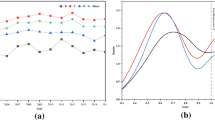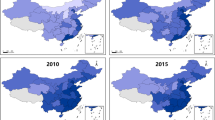Abstract
This research evaluates the eco-efficiency of provincial industrial systems in China using the innovative Meta-frontier slacks-based measure dynamics network data envelopment analysis (Meta-frontier SBM-DNDEA) method. The findings reveal that the overall eco-efficiency level of these systems is unsatisfactory, with substantial room for improvement. In particular, the western region lags in clean production technology, resulting in a significant technological gap between provinces. Furthermore, industrial eco-efficiency performs best at a medium scale of total industrial output value, with larger scales not performing as well. The study concludes that outdated production technology and low management levels are the primary causes of poor eco-efficiency. This study not only identifies key areas for technological and managerial advancements but also provides actionable strategies to optimize resource use and reduce environmental impacts. The findings are significant as they offer new insights into regional disparities and propose targeted interventions to support sustainable industrial development in China.












Similar content being viewed by others
Data availability
The datasets analyzed during the current study are available in the China industry statistical yearbook, http://www.stats.gov.cn/english/.
References
An R, Yu B, Li R, Wei Y-M (2018) Potential of energy savings and CO2 emission reduction in China’s iron and steel industry. Appl Energy 226:862–880. https://doi.org/10.1016/j.apenergy.2018.06.044
Battese GE, Rao DSP, O’Donnell CJ (2004) A metafrontier production function for estimation of technical efficiencies and technology gaps for firms operating under different technologies. J Prod Anal 21(1):91–103. https://doi.org/10.1023/b:Prod.0000012454.06094.29
Charnes A, Cooper WW (1962) Programming with linear fractional functionals. Naval Res Logist Q 9(3–4):181–186
Chen Y, Cook WD, Li N, Zhu J (2009) Additive efficiency decomposition in two-stage DEA. Eur J Oper Res 196(3):1170–1176. https://doi.org/10.1016/j.ejor.2008.05.011
Chen X, Zhang JY, Yang CY, Lu CC, Wang J (2024) Green cost performance measure of China’s thermal power industry: evidence from Chinese 30 provinces. Environ Dev Sustain. https://doi.org/10.1007/s10668-023-04372-w
Fan J-L, Zhang Y-J, Wang B (2017) The impact of urbanization on residential energy consumption in China: an aggregated and disaggregated analysis. Renew Sustain Energy Rev 75:220–233. https://doi.org/10.1016/j.rser.2016.10.066
Fang H, Wu JJ, Zeng C (2009) Comparative study on efficiency performance of listed coal mining companies in China and the US. Energy Policy 37(12):5140–5148. https://doi.org/10.1016/j.enpol.2009.07.027
Färe R, Grosskopf S (2004) Modeling undesirable factors in efficiency evaluation: comment. Eur J Oper Res 157(1):242–245. https://doi.org/10.1016/S0377-2217(03)00191-7
Färe R, Grosskopf S, Noh D-W, Weber W (2005) Characteristics of a polluting technology: theory and practice. J Econom 126(2):469–492. https://doi.org/10.1016/j.jeconom.2004.05.010
Feng XS, Tao ZB, Shi RL (2024) The Spatiotemporal exploration of intercity transport energy efficiency in the mainland of China on the basis of improved stochastic frontier modelling. Renew Energy. https://doi.org/10.1016/j.renene.2024.120228
Han YM, Qu SY, Han FJ (2023) Research and evaluation of spatiotemporal dynamic of network green innovation efficiency in China-based on meta-Frontier theory. Front Environ Sci 11:66. https://doi.org/10.3389/fenvs.2023.1209883
Huang X, Zhao RZ (2024) Regional differences and improvement potential of carbon emission efficiency in China’s power industry: insights from meta-frontier DEA model considering integer constraints. Front Energy Res. https://doi.org/10.3389/fenrg.2024.1339553
Jian O (2002) On the status and function of industrial economy in regional economic development. Explor Econ Issues 6:5–6
Jin BH, Li W, Li GM, Wang Q (2024) Does upgrading household consumption affect the eco-efficiency of China ’ s solid waste management as measured by emissions? Util Policy 89:66. https://doi.org/10.1016/j.jup.2024.101767
Kao C (2017) Network data envelopment analysis: foundations and extensions. Springer, Switzerland. https://doi.org/10.1007/978-3-319-31718-2
Li L, Zhao RZ, Huang FH (2023) Environmental performance of China’s industrial system considering technological heterogeneity and interaction. Sustainability. https://doi.org/10.3390/su15043425
Lin B, Zhu J (2020) Chinese electricity demand and electricity consumption efficiency: Do the structural changes matter? Appl Energy 262:114505. https://doi.org/10.1016/j.apenergy.2020.114505
Lin C-H, Chiu Y-H, Huang C-W (2012) Assessment of technology gaps of tourist hotels in productive and service processes. Serv Ind J 32(14):2329–2342. https://doi.org/10.1080/02642069.2011.593170
Liu J, Ji L, Sun Y, Chiu Y-H, Zhao H (2024) Unleashing the convergence between SDG 9 and SDG 8 towards pursuing SDGs: evidence from two urban agglomerations in China during the 13th five-year plan. J Clean Prod 434:139924. https://doi.org/10.1016/j.jclepro.2023.139924
Meng M, Pang TT (2023) Total-factor generation performance analysis of China’s thermal power industry using meta-frontier nonradial distance function approach. Energy Sci Eng 11(7):2668–2685. https://doi.org/10.1002/ese3.1468
Nakaishi T, Takayabu H, Eguchi S (2021) Environmental efficiency analysis of China’s coal-fired power plants considering heterogeneity in power generation company groups. Energy Econ. https://doi.org/10.1016/j.eneco.2021.105511
Nakamoto Y, Eguchi S (2024) How do seasonal and technical factors affect generation efficiency of photovoltaic power plants? Renew Sustain Energy Rev. https://doi.org/10.1016/j.rser.2024.114441
O’Donnell CJ, Rao DSP, Battese GE (2008) Metafrontier frameworks for the study of firm-level efficiencies and technology ratios. Empir Econ 34(2):231–255. https://doi.org/10.1007/s00181-007-0119-4
Ramalho EA, Ramalho JJS, Henriques PD (2010) Fractional regression models for second stage DEA efficiency analyses. J Prod Anal 34(3):239–255. https://doi.org/10.1007/s11123-010-0184-0
Ren FR, Cui Z, Ding X, Zhang XR, Li RH, Yao Q, Liu XY (2023) The co-benefit of emission reduction efficiency of energy, CO2and atmospheric pollutants in China under the carbon neutrality target. Energy Strategy Rev. https://doi.org/10.1016/j.esr.2023.101125
Schaltegger S, Sturm A (1990) Ecological rationality: approaches to design of ecology-oriented management instruments. Die Unternehm 44:273–290
Song CZ, Yin GW, Lu ZL, Chen YB (2022) Industrial ecological efficiency of cities in the Yellow River Basin in the background of China’s economic transformation: spatial-temporal characteristics and influencing factors. Environ Sci Pollut Res 29(3):4334–4349. https://doi.org/10.1007/s11356-021-15964-2
Tone K (2001) A slacks-based measure of efficiency in data envelopment analysis. Eur J Oper Res 130(3):498–509. https://doi.org/10.1016/s0377-2217(99)00407-5
Tone K, Tsutsui M (2010) Dynamic DEA: a slacks-based measure approach. Omega-Int J Manag Sci 38(3–4):145–156. https://doi.org/10.1016/j.omega.2009.07.003
Tone K, Tsutsui M (2014) Dynamic DEA with network structure: a slacks-based measure approach. Omega-Int J Manag Sci 42(1):124–131. https://doi.org/10.1016/j.omega.2013.04.002
Wang M, Feng C (2024) How can technology and efficiency alleviate the dilemma of economic growth and carbon emissions in China’s industrial economy? A meta-frontier decoupling decomposition analysis. Pet Sci 21(2):1415–1428. https://doi.org/10.1016/j.petsci.2023.10.004
Wang Q, Zhou P, Zhou D (2012) Efficiency measurement with carbon dioxide emissions: the case of China. Appl Energy 90(1):161–166. https://doi.org/10.1016/j.apenergy.2011.02.022
Wang QW, Zhao ZY, Zhou P, Zhou DQ (2013) Energy efficiency and production technology heterogeneity in China: a meta-frontier DEA approach. Econ Model 35:283–289. https://doi.org/10.1016/j.econmod.2013.07.017
Wang Y, Ren Y, Wu D, Qian W (2023) Eco-efficiency evaluation and productivity change of Yangtze River Economic Belt in China: a meta-frontier Malmquist-Luenberger index perspective. Energy Eff 16(4):23. https://doi.org/10.1007/s12053-023-10105-9
Wang M, Zhang XM, Feng C, Wen SX (2024) Towards a sustainable construction: a newly proposed Tapio-global meta-frontier DEA framework for decoupling China’s construction economy from its carbon emissions. Sci Total Environ 929:66. https://doi.org/10.1016/j.scitotenv.2024.172727
Wei C, Ni J, Du L (2012) Regional allocation of carbon dioxide abatement in China. China Econ Rev 23(3):552–565. https://doi.org/10.1016/j.chieco.2011.06.002
Wei W, Jianye Z, Penghua Q (2014) Research on the Coordinated development of regional scientific and technological talents, Industrial economy and ecological environment: based on the panel data of 18 large cities in China. Sci Technol Prog Countermeas 31(7):37–42
Yao FG, Qin ZA, Wang XM (2022) Industrial green technology innovation efficiency of China. Front Environ Sci 10:66. https://doi.org/10.3389/fenvs.2022.1076974
Zeng S, Nan X, Liu C, Chen J (2017) The response of the Beijing carbon emissions allowance price (BJC) to macroeconomic and energy price indices. Energy Policy 106:111–121. https://doi.org/10.1016/j.enpol.2017.03.046
Zhang X, Wang K, Hao Y, Fan J-L, Wei Y-M (2013) The impact of government policy on preference for NEVs: the evidence from China. Energy Policy 61:382–393. https://doi.org/10.1016/j.enpol.2013.06.114
Zhang L, Zhao LL, Zha Y (2021) Efficiency evaluation of Chinese regional industrial systems using a dynamic two-stage DEA approach. Socioecon Plann Sci 77:12–12. https://doi.org/10.1016/j.seps.2021.101031
Zhou P, Ang BW (2008) Linear programming models for measuring economy-wide energy efficiency performance. Energy Policy 36(8):2911–2916. https://doi.org/10.1016/j.enpol.2008.03.041
Zhou C, Shi C, Wang S, Zhang G (2018) Estimation of eco-efficiency and its influencing factors in Guangdong province based on Super-SBM and panel regression models. Ecol Ind 86:67–80. https://doi.org/10.1016/j.ecolind.2017.12.011
Funding
This research program support by the research start-up fund of Guangdong Ocean University (Grant Number: 060302092308).
Author information
Authors and Affiliations
Corresponding author
Ethics declarations
Conflict of interest
The authors have no relevant financial or non-financial interests to disclose.
Additional information
Publisher's Note
Springer Nature remains neutral with regard to jurisdictional claims in published maps and institutional affiliations.
Rights and permissions
Springer Nature or its licensor (e.g. a society or other partner) holds exclusive rights to this article under a publishing agreement with the author(s) or other rightsholder(s); author self-archiving of the accepted manuscript version of this article is solely governed by the terms of such publishing agreement and applicable law.
About this article
Cite this article
He, K., Jie, L. Evaluation of the eco-efficiency of the industrial system in China considering regional heterogeneity and dynamics. Oper Res Int J 25, 2 (2025). https://doi.org/10.1007/s12351-024-00881-2
Received:
Revised:
Accepted:
Published:
DOI: https://doi.org/10.1007/s12351-024-00881-2




